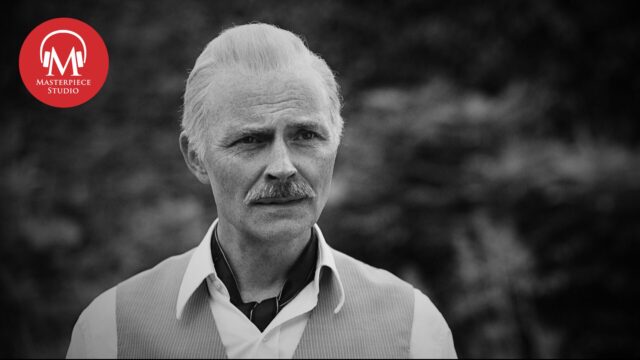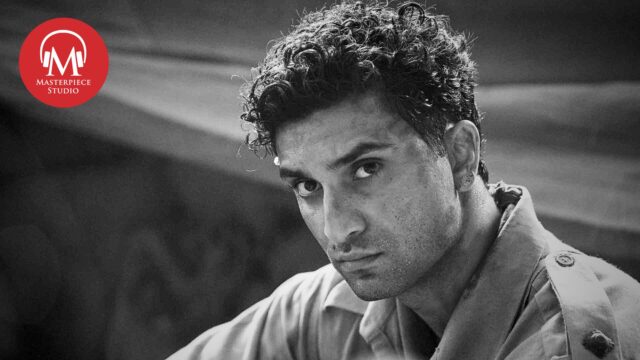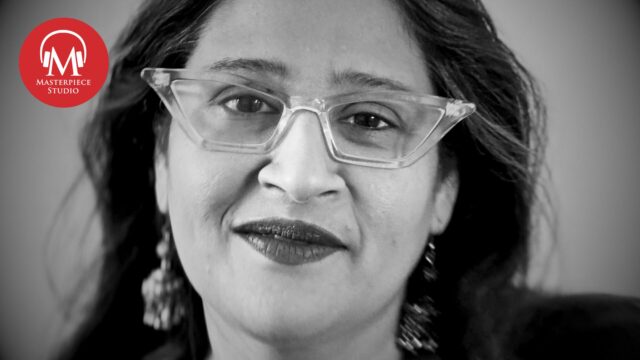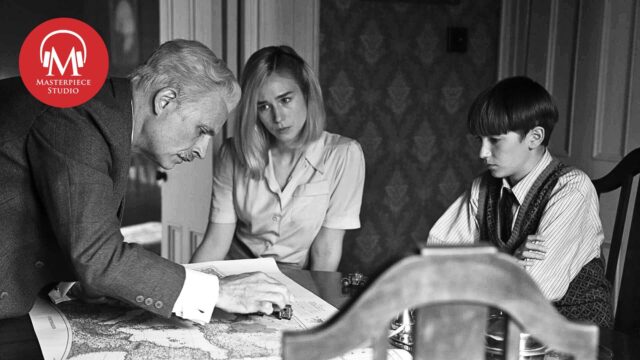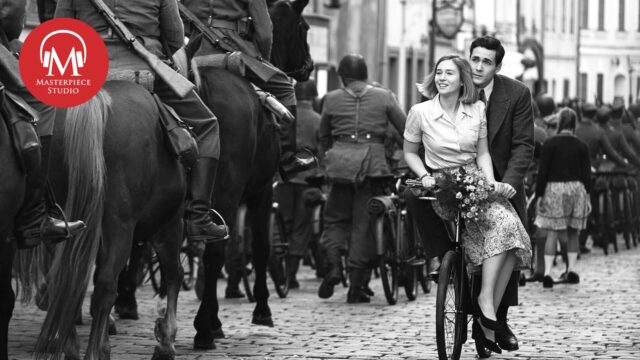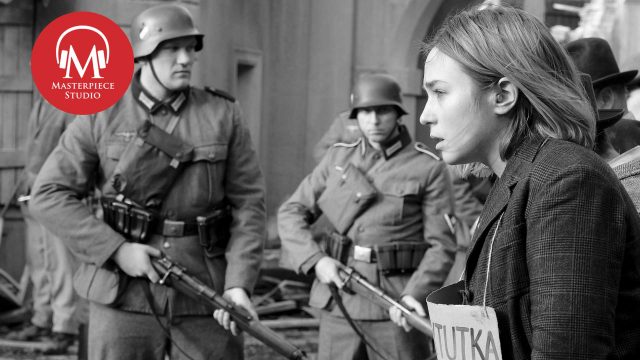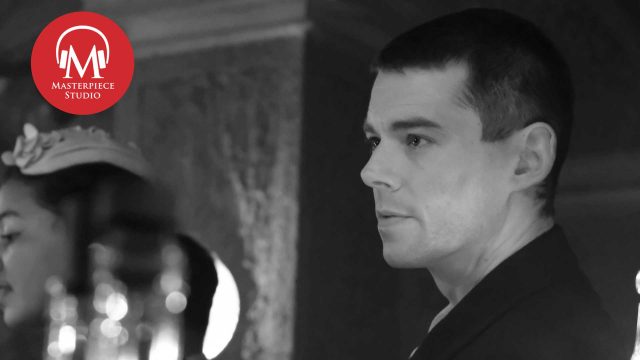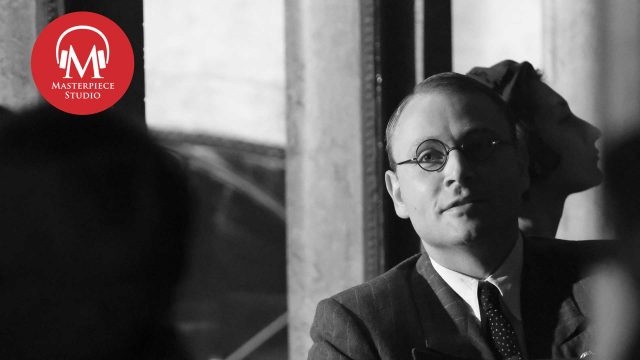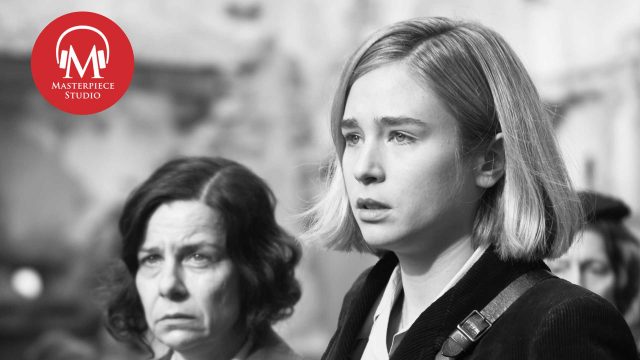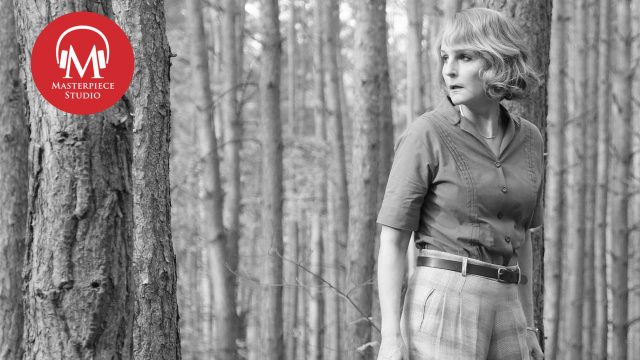During World War II, Julia Brown’s grandmother was a jazz singer, which gave the World On Fire star a broad starting point for her fiercely independent character, Lois Bennett. But in Brown’s hands, Lois is a strong and sharply independent young woman looking for adventures of her own.
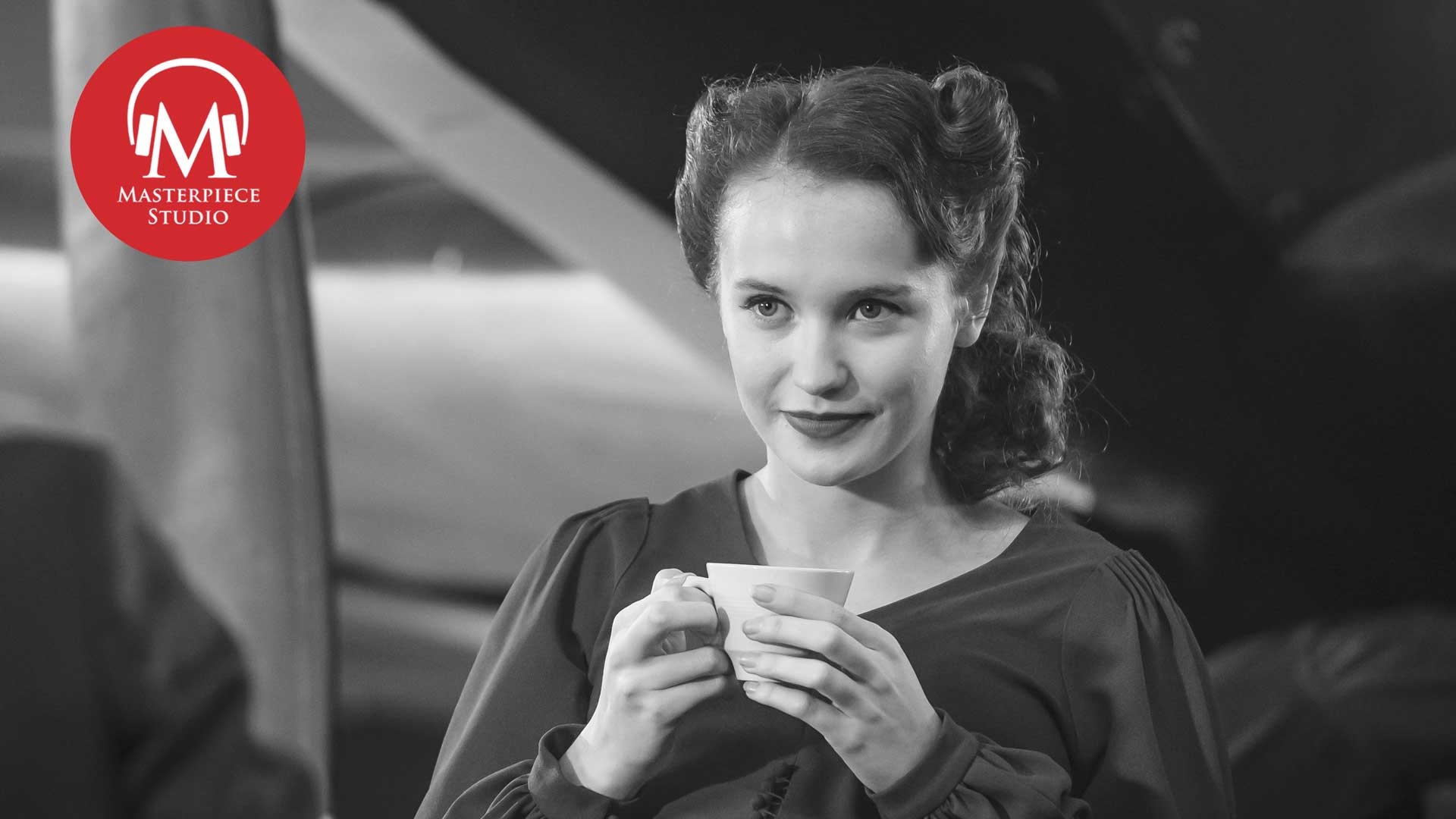

Julia Brown Borrows From Family History For Her Lois Bennett
Released 33:04
Related to: World on Fire, Season 1
Download and subscribe on: iTunes | Spotify| RadioPublic
Transcript
Jace Lacob: I’m Jace Lacob, and you’re listening to MASTERPIECE Studio.
Mancunian factory girl Lois Bennett knows exactly what she wants — even if none of the men in her life seem able to realize that…or to get out of her way.
CLIP
Harry None of this makes sense, I don’t know what you’re saying…
Lois I gave you my heart, Harry! And you betrayed me in the snap of some Polish knicker elastic. So please don’t get confused about me giving you my virginity because that was just something I had to get out of the way.
Harry Lois, I…
Jace After boldly spurning her first love, Harry Chase, Lois finds herself very much in the family way, and in the service of the British Entertainments National Service Association.
CLIP
Lois: Love me, or leave me, and let me be lonely…
Jace She’s got more than one soldier pursuing her hand, and a very clear sense of right and wrong.
CLIP
Louis Don’t say anything.
Douglas Why didn’t you tell her you were having his kid?
Lois She doesn’t need to know. She really doesn’t…Jace World on Fire star Julia Brown didn’t let the fact that her character was partly based on series creator Peter Bowker’s real-life ENSA grandmother distract from Lois’ own story, and she joins us to explain how she navigated the tricky role.
Jace And this week, we are joined by World on Fire star Julia Brown. Welcome.
Julia Hello! Thank you.
Jace What was your first impression of Lois when you read the scripts for World on Fire?
Julia That she was so different to any kind of character, a female character, I’d read in a period drama before. ‘Cause she’s so forward thinking and bossy and confident. And yes, she’s got this beautiful essence about just going for things. But then she has this need to survive and she looks after her family, and she kind of always almost pushes her own emotions to one side and fights for what she believes in and fights for those around her. So, yeah, I just loved her independence and spark and fire. And Peter didn’t shy away from that or try and put her as a typical 1939 woman, which I really liked.
Jace I mean, I love the fact that when we first meet her, it’s not at a tea dance or something like that, but she’s actually like standing up to a crowd of angry white nationalists.
Julia Yeah.
Jace And that’s the Lois we meet from the first minute.
CLIP
Blackshirts: Black shirts, black shirts, black shirts!
Harry / Lois: Pack up all my cares and woe, Here I go, singing low, Bye, Bye, Blackshirts!
Blackshirt: Shut up!
Lois: Harry! Harry! Stop!
Blackshirt This is all we have to fear! Take a good look. The Jews! The Communists!
Lois Get back to the sewers, you fascist rats!
Julia Yeah, it’s a yeah, a good introduction to her and just how…I like the contrast between her and Jonah Hauer-King’s character. They’re from very different worlds. And I think in that scenario, you can see that Lois is the one who’s out raring to go and she’s wailing on anyone who wants to challenge her, whereas Harry’s a little bit more frightened about his surroundings. And I think that’s a brilliant way to open the series.
Jace What was the audition process like for this project, particularly given that Lois is a professional jazz singer?
Julia Yeah, it was a bit crazy actually, ’cause I had read the, well a little bit of the script because my friend was going up for the part of Harry and I’d helped him with his audition and I loved it so much. And I wrote to my agent said, ‘Please, can you get me in for this?’ And she said, ‘I’m really sorry, Julia, but they’re seeing girls from Manchester and the surrounding areas,’ because they wanted someone with a genuine Manc accent. And I’m from Scotland, in case you didn’t notice. Yeah, so then months later, they obviously hadn’t found who they were looking for and they opened it up to more people. And Victor Jenkins, who’s an amazing casting director, so he saw my tape and got me in two weeks later. On the tape, I had to sing a little bit, and I just chose to sing, ‘Dream A Little Dream,’ anyway, not really realizing that that was potentially going to end up in the series as well, which is a funny coincidence. But my granny was a jazz singer in the war and she always sang jazz until she passed away, she was like singing in her sleep. She was always singing to me. So it was really kind of personal and special that and that they did have the chance to play a jazz singer. And I hadn’t ever sang jazz before, but I had been classically trained and always sang throughout my youth. So getting to do it was a dream because I also got to learn a new skill on the job.
Jace Which is always nice.
Julia Yeah.
Jace There is a beauty in the scripts written by Peter Bowker, especially rather than following Churchill and Hitler, World on Fire focuses on ordinary people that are sort of caught in the crossfire in the sort of extraordinary circumstances of wartime. Is that one of the things that initially attracted you to the project — the ability to sort of see a Northern girl go through the war as opposed to focusing on, you know, Hitler?
Julia Yeah, definitely. I think growing up, you kind of get the historical retelling of the war. You read the history books, and it’s all kind of dates and facts, and as you say, like the influential figures of the war and everything. And you don’t hear about the stories of the ordinary people and what it was like for people just going about their daily lives. And then the next day they have bombs dropping on their doorstep. And I think that was really special because those were the stories I’d grown up with from my grandparents and heard about their experiences in World War II. And they’re the ones that you don’t really see on the screen that often. And I think it’s quite important to reconnect the youth of today with what happened to show how awful and destructive war can be and to remind them of that, because I think a lot of young people think, “Oh, those were in olden times like it happened so long ago that it really didn’t,” it was not that far out of reach. And them it was special to explore, you know, these young people having the same feelings and relationships and jobs that we do nowadays and having to see them fight to survive and to get on with their daily lives.
Jace What did you make of the fact that Peter Bowker was inspired to create Lois on his own grandmother, Rowena?
Julia It was slightly nerve-wracking because I knew that I had to do her justice. But Peter was amazing when I started, he showed me a photo of Rowena and her best friend Anna, who’s his Auntie Anna, he called her. And then it was just really special for Yrsa Daly-Ward and I to know that we were kind of honoring these women. But also, Peter was quite good at saying, you know, this is your artistic license. You don’t need to try and be this person. That’s that’s not what it’s about. And he’d just use that as a sort of starting seed. But yeah, it’s really special. And I think it’s for everyone to have these personal connections. And just to know that you’re sharing a little bit of their story was a great thing. And it was great to have that as a starting point.
Jace Did you have any conversations with Peter about Rowena specifically or her life during World War II? I mean, as you say, he said to give you sort of artistic license, but were there conversations about that when you were building the character initially during rehearsals?
Julia Yeah, especially about the music side. He told me quite a lot about what it was like for them touring the clubs and being around the clubs of the north. And it kind of, it made it easier for me to realize what it would be like for a working class girl like his grandmother, probably hadn’t left England ever. And at the start of the war, they get the opportunity to go to France and, you know, how amazing! And also it’s quite different because the war was actually opening up doors for them and they were getting paid ten pounds a week. I looked into how much you get paid as an ENSA entertainer and which was a lot more money than what they were surviving on before. So I think it’s quite exciting for both of them. And they want to grasp the opportunity to get to go away and meet new people and experience new culture. But then when they get there, I think the gravity of the situation kind of hits a little bit and it’s a bit scary to think what they’re in the middle of.
Jace I mean, I’ve heard there was a fairly lengthy rehearsal process for World on Fire, which is unusual for a television production. What sort of discussions did you and Jonah Hauer-King have about creating the backstory for Lois and Harry’s relationship?
Julia We had to kind of discuss where we think they might have met because they come from such different worlds. And Peter was quite great at saying like, “I want you guys to come up with this because they’re your characters.” And we kind of decided that they probably bonded over politics. Maybe they’d met at a rally before where we think Harry’s maybe stood in the back corner and Lois’s is up the front and like, shouting, and he’s been excited by a girl like this. Probably hadn’t seen someone like this before, especially not from his part of society. And yet so we had some good chats to just like to kind of come up with their backstory. And then the production company was amazing and they sent us to do some experiences together. So we went and did an escape room to experience like an adrenalized situation which helped with the Blackshirts rally. And we went and did a VR experience just like us walking the plank and falling off things. And it just kind of made us bond quite quickly and we had to have a good laugh together, which was really important when you had to do more serious scenes that you could kind of switch between the two, and become good friends.
Jace One of the reasons that the first episode works so effectively is that we see Lois and Harry declare their love for each other, only for Harry to effectively disappear and ghost her when he meets a Polish girl without a word. And what does Lois make of the inexplicable silence? What’s going on in her head?
Julia Yeah, I think she’s going through lots different scenarios because she wants to get on with things that she has to get on with things. So I think she tries to push it aside. But I think when, you know, she’s done the washing up for dad and brother and she goes up to her room, she must turn over so many things. I think the one thing is, is he in danger? And you see that in episode one, when she goes to see her Robina to find out if she’s heard anything. I think she’s just desperate to know that he’s okay.
CLIP
Lois I just need to know he’s alright!
Robina Harry must have come to his senses. And I advise you to do the same.
Lois So why hasn’t Harry written any this to me?
Robina I’m afraid men are terrible cowards when it comes to this kind of thing.
Julia But I think there’s there’s a seed of doubt definitely at the bottom that maybe he’s met somebody else or he doesn’t still love her. And I think also she’s beating herself up about the fact that she’s almost pushed him away a little bit. She’s tried to be pragmatic and sensible and say, look, you know, you’re going away. And it’s that horrible thing. And I still do it today. If, like you say something you don’t really mean because you’re trying to get on with things and keep yourself protected. But they actually you can end up getting more hurt that way. And I think it’s crazy to think of what those women must have gone through when, you know, their partner went away. There must be so many different scenarios you can make up in your head. Can’t even imagine how much it would tear you apart. But yeah, she’s a strong woman. She still cracks on with her day to day.
Jace Lois’s homelife is interesting to me. She’s had to step up into a maternal role looking after her wayward brother and her father, who has PTSD from that First World War. And how does the death of her mother inform who she is as a character when we first meet her at the outset of the story?
Julia We decided when I kind of spoke to Sean and Ewan, who plays my brother, and we were coming up with the backstory of family that Lois has lost her mother, 14. So it’s quite a young age. You’re still discovering yourself and trying to like develop into a woman, but she suddenly had to be OK. Now I’m taking a mum’s duties look after the house, cook, clean. And she has a lot of patience for her father because he has quite few meltdowns and breakdowns. But she’s just there to kind of hold his hand and get through, even though she’s going through her own trauma. It’s this need to be strong and get on with things. And sometimes I think it can work against her because it means that she has not much capacity left to think about her own feelings and just be a girl. Like, I think she skipped that stage. It’s gone straight into working two jobs, trying to make the money, keep food on the table.
Jace How much research did you do into ENSA and the women who performed during the Second World War?
Julia Yeah, I was really fortunate, I actually came across an archive of personal accounts on BBC history page and a lot of people had written in. When I think somebody was doing a PHD on ENSA and they, lots of veterans and people had lived through the word written and with their stories about ENSA and so there’s all sorts of personal accounts of like tap dancers, ventriloquists and jugglers and people who didn’t really have a job in day to day society, like they just had a weird quirk or talent. And then suddenly they’re like, oh yeah, come along and entertain the troops in weird and wonderful places.
Jace At the time, ENSA was often referred to rather tongue-in-cheekly as, “Every night, something awful.”
Julia Yeah.
Jace Did you have any thoughts about how to frame Lois’s performance in that context?
Julia Yeah, we discussed this actually amongst the group. So we had an amazing group of supporting artists who…we had an 86 year-old accordionist called Steve.
Jace Whoa!!
Julia He was so sweet, and we had a real ventriloquist, and they were saying like so we meant to be the bad ones? We think that Lois and Connie were probably like a rose among thorns. They were. And the soldiers certainly liked them. So that was fun to play with. But also, I think we decided that especially when I was doing the practice for the singing, I didn’t want it to sound overly perfect because she would have been a working class girl who hadn’t had any singing training. So it was quite good that we didn’t go for a sort of, you know, Amy Winehouse, strong jazz voice, which was also good for my abilities as well, that we could go for, yeah.
Jace Her decision to join ENSA and head out to the front puts her at odds with her pacifist father, Douglas. And even as Tom heads into battle.
CLIP
Douglas Tom. I wish you’d understand. We can’t just register any lad who comes back from war and says he’s a Conchie?
Tom It’s not any lad, is it? It’s me.
Douglas And like I keep saying, that’s part of the problem. You’re my son. They’d crucify you.
Tom The problem is that I am your son. And you can’t see anything in me of yourself…
Jace How does the war effort clarify their family bonds or complicate them?
Julia Oh, I think it complicates them quite a lot. And I think the hardest thing is for Douglas. He just wants his children to be happy and healthy. And I think he’s probably gone through seeing them lose their mother. And he’s trying so hard to do both. But he’s also suffering with his own mental illness. And Tom, oh he’s a complicated boy. I think at the same time, he’s going through his own heartbreak and he’s never really faced with his grief with his mother. And he said that means that he’s gone a little bit wayward. But Lois, also, I don’t think she’s faced grief because she’s had to crack on with things. And then I think this I think she struggles with the thought of leaving her dad alone because she knows what he’s going through. But she sees that her her brother’s just kicking on with whatever he wants to do. And this is her passion. And she’s now faced heartbreak. And, you know, it’s like do or die need to just she’s following her passions. But I think you’ll see as the family sort of gets moving back together as they go through difficult times, I think they show their true bond with each other, which is quite a nice contrast to Robina and Harry’s situation. It’s quite different. I think family is very, very important to all three of the Bennett family. Even when they are complicating things by running off and leaving their dad alone, bless ‘em.
Jace There is a tender if rather fraught bond between Lois and Tom. How would you categorize their relationship as siblings?
Julia I think they’d probably been best friends up until they lost their mum. And I can imagine them being kind of, you know, thick as thieves and squabbling with each other, but being really, really close. And I think Tom has probably struggled quite a lot when Lois’s tried to then mother him. And she’s now trying to look after the house. And we decided that we think Tom is a bit older than Lois, but Lois seems like the older sister because she’s definitely looking after everyone. And I think that’s put quite a bit of tension in between the two of them. But there’s some really beautiful sensitive scenes that Peter’s written of just the two of them talking to each other in the bedroom. I think that’s when you can see the true family bond and how much they love each other.
Jace Before this next question, let’s take a quick break to hear a word from our sponsors…
Jace You mentioned your own grandmother, who was a jazz singer during the war. I mean, how did this experience further connect you to her and your own familial history?
Julia Yeah, it was really special for me to sit down with, like mom and dad. And, you know, we were like, OK, what stories can we remember that grandpa and granny and everyone told us? And yeah, it was quite bittersweet. So I kind of wish that they had been around to see me do this. And I know how much they would have loved, you know, all the attention to detail, the costumes and the sets and such a beautiful era to see on screen. And I think it would’ve been really special for them to get to see. Yeah, it made me a lot more aware of like, I think when you grow up, you kind of listen to these stories of, oh Grandpa’s talking about the war again. But actually, as I was older, I came to appreciate like, wow, the stories you told. They were never stories of like trauma or awful situations. He was always telling me, like quite funny stories or the things that he’d held on to where. Yeah, about him having laugh and Eve’s on the Home Guard or he told me a story about. His grandma, and his mother sorry, my great grandmother, and they lived on a farm and German prisoner of war was sent to work on the farm. And one day when he finished his shifts, my great grandmother gave him some strawberries and the guy began to cry because I think he’d never been shown like human kindness since he’d been kept in Scotland. And it was all these things that my grandpa held onto which were about humanity. And I think that was really special to like sit with my parents and talk about that and think how I could bring that into the script and into Lois.
Jace At what period specific singers did you listen to in order to prepare for the role? And was there any sort of specific singer that you tried to emulate?
CLIP
Lois: Living for you // is easy living // it’s easy to live // it’s easy to live when you’re in love // I’m happy to do whatever I do for you // For you maybe I’m a fool but it’s fun…//people say you rule me one wave of your hand // darling, it’s grand….they just just don’t understand // living with you is easy living // it’s to live // when you’re in love // and i’m so in love // there’s nothing in life but you
Julia Oh, there’s so many amazing singers and I don’t think I could do any of them. Like I didn’t try to be like any of them because I knew I wouldn’t pull off. It was interesting because a lot of the actual ‘30s songs were recorded by men. Obviously, Eddie Cantor had performed quite a lot of songs, so that kind of took him as a base point of the sort of style we were going for. But then it was the amazing jazz singers of like the ‘40s and ‘50s that I was really inspired by. Etta James and Dinah Washington and Nina Simone. They had done such amazing covers of all these classic songs. I didn’t want to copy any of them because I was trying really hard to make sure it was 1939, but to take yet influences from them. And they just they come to life like when they’re singing, you can hear the smile in their voice and all the different emotions they try to convey through song. So yeah, I had a few playlists, one which was like a 1939 playlist that is quite strict on the 30s’ style and then a few more modern versions.
Jace Lois definitely captures that sense of just get on with things spirit, that must have been common during the war that life goes on and you just sort of soldier on. I mean, she’s pregnant. Her brother is away at war. She’s been jilted. She’s got a lot to carry. Does that sense of determination power her or, is it more about denial?
Julia I think a little bit of both. I think she denies her own feelings to try and protect herself, but really sometimes she should just let them in and tell people how she feels. But yeah, I think the determination drives her. She’s got that. You can see that from, you know, the first 10 seconds of the episode of just this fire in her belly, which I just love. And. Yeah, sometimes you’ve not got your priorities straight. But as you know, all the characters are flawed in their own way and you can see them across the series develop into really strong adults. So they go, in a sense, from children to adults across the year. And yeah, you’ll see her go through a lot, but her determination definitely does drive her forward.
Jace I love the friendship between Lois and Connie, which I think it’s great. And what do you make of their dynamic and their sort of friendship?
Julia Oh, I love it. I think in a way, Connie’s character is a little bit of a mother figure to Lois. And sometimes she puts her on the right track when she’s going off of a bit.
CLIP
Connie What are you looking for? Divine inspiration?
Lois Something like that. It’s not exactly France, is it? Any closer to home, and we’d be able to walk here.
Ted Lois, bit of a delicate matter. Wonder if you can just stay still when you sing today?
Lois Stay still? Yeah I think I can manage that Ted.
Ted ‘Cause when you move. Not everything else moves at the same time. If you get my meaning.
Lois Are you saying I wobble, Ted?
Ted No, just some of these lads have got mothers, you know
Connie Some of these lads?
Ted They don’t want to be looking at a lady in the family way in a way they might look at a normal woman…
Connie Might be easier if you gave them blindfolds, Ted!
Julia And yeah, I think it’s just that that one person that Lois feels it really knows her inside out. Only Lois has many other friends. And I think also because she’s a bit of a tomboy and in a sense, she doesn’t come close to many girls. And I think she might find it hard to come close to girls after losing her mom. But Connie yet knows her inside out. And Yrsa Daly Ward who plays Connie is just amazing to work with because I was quite worried like that. You’d have that chemistry straight away with someone and a met on the first day. And I was like, yeah, we’ll get along. So it was great to get to work with her.
Jace How does the arrival of Jan further shatter Lois’s equilibrium? It is pretty fragile at this point anyway.
Julia Yeah, I think it’s a bit confusing. Like who is this boy? But in a way you can see that like beautiful maternal instinct come out of her when she’s here playing a game with Jan. And I think it’s nice because it brings out a softer side. And Lois. Maybe if she was around Harry and Jan wasn’t there, she’s gonna be giving him hell. But am I? And I think that’s also something that makes it a bit more heartbreaking for Harry as he sees Lois with Jan and he’s reminded of that loving side of her that he loved and that he’s ultimately betrayed. So, yes, he’s a great little vessel, Jan.
Jace On this week’s episode, she did soldier on. She performed for the troops while very, very pregnant. She also met fighter pilot Vernon Hunter, whom she gives her address so he can write. “No poetry,” she says. What does Lois make of Vernon, post Harry? How is he different?
Julia She’s very tentative still because she doesn’t really want to trust any other men. And you can see that with her reception of Randy when she first sees Randy, she’s not very polite. But I think Vernon melts her little bit, especially with the music. You know, when he’s playing the piano and that’s something that she shares a passion for and I think she doesn’t want to be trusting, but this is the first person who’s just shown her kindness and that’s all he’s doing, he’s not trying to flirt with her or be inappropriate or, he’s just honest and kind. And it’s quite nice. It’s like a nice, warm hug for her after going through a lot. And I think it’s, she can see that he can sort of see her true character. So she’s quite happy to have a little letter from him.
Jace I love the exchange that Vernon and Lois have about judgment.
CLIP
Vernon I’m not fighting for Britain. Not for Mr. Churchill. But so people can get on with living their lives in whatever way they choose…that’s the only freedom I’m fighting for.
Lois So you’re an anarchist then, Vernon?
Vernon Yes. I suppose I am. Me and Mr. Orwell. I meet a lot of men who think they’re strong, Lois, but I know strength when I see it. And you have it in abundance.
Lois Well, thank you. I don’t feel very strong right now, but thank you.
Jace I mean, do you see her as inherently strong and has her heartbreak only strengthened her further?
Julia Yeah, I do. She also has her weaknesses, though, as do all the characters. But m. Yeah, I think her heartbreak has certainly made her externally stronger, whether if inside, she is. But what she does, the front that she puts on and shows people, yeah, it’s definitely made her stronger.
Jace Vernon says, “It’s about the only thing left to believe in, isn’t it? Kindness.” There is a message embedded in this exchange that I think applies to World On Fire as a whole about kindness and about humanity. Something I asked Peter about Boweker about as well. And is that a lesson that those of us watching in 2020 can take away from this about kindness versus cruelty?
Julia Yeah. And I think when there is no tension in politics and when things are starting to get very divisive between different groups of society, that’s the important thing to remember is it doesn’t kill to be kind. Yeah. So I think it’s beautiful and this beautiful message that will always exist and be strong.
Jace You mentioned Randy. There is some chemistry going on between Lois and Randy, the Canadian pilot. Is this the beginning of a love triangle?
Julia Oh, really?
Jace That’s how I saw it.
Julia Oh do you? Oh, that would be interesting. Don’t know if she’d be able to balance that many men at once. But yeah, I just wonder what’s going to happen with her relationship with Vernon, as well, whether that will go anywhere. But yeah, I don’t know. I think she’s been in one too many love triangles for now.
Jace There’s two episodes left. What can you tease about what’s coming up for Lois in these final two?
Julia Well, what’s going to happen with that large bump on her front? Who knows? You will see her have to maybe face up to some people that she’s been around with before and think about what it might like to know, that might be like if she’s going into motherhood. And. Yeah, what’s gonna happen to her family situation, what is Douglas going to deteriorate more? Will she have to look out for him more? Will her brother come back? There’s a lot on her plate.
Jace There is indeed. World on Fire has been recommissioned for a second season. Where would you like to see Lois’s arc go next?
Julia I think, and I’ve spoken to Peter about this as well. I would love to see Lois’s own adventure. I think it’s important to kind of explore her own, you know, it’s been beautiful seeing her singing and her passion for music. But yeah, I want to play on that part of that she’s a strong female character aside to heartbreak and love triangles and relationships and see where her own journey aside from men, but that might be difficult and there might be a baby in the mix or what’s going to happen, or yeah, to see where she might go in the next year of her life following her own passions and dreams.
Jace Douglas can change the nappies.
Julia Exactly.
Jace Right? Lois is a very different character than that of Molly Kilmer — or Lizzie Kilmer in the fourth season of Shetland. What attracts you to a role, ultimately?
Julia If I get given them! No, to begin with, I hate when I read the character breakdown says something like, ‘The pretty girl next door,’ and it’s just so cheap and like it just…
Jace ‘Pretty, but doesn’t know it.’ The worst.
Julia Just stereotypical crap like taglines for females. I think it’s so great that we break out of these character pockets and yeah. With both Molly and Lois, they were vulnerable and strong and complicated and there were so many different shades to their character to explore. And I think that’s important when I get a breakdown through that tere’s a lot to play with. And when it’s about personality and it’s all about journey and nothing to do with looks and costumes.
Jace Julia Brown, thank you so very much.
Julia Thank you so much for having me.
Jace As one of two American leads in World on Fire, Brian J. Smith has a lot to uphold for his American-based MASTERPIECE audience. His Webster O’Connor is a stranger in the strange land of war-torn, occupied Paris, caught between his privilege as a white American and his true nature as a semi-closeted gay man.
Brian J. Smith: For someone like Webster or for someone like myself to find themselves in Europe is a bit shocking, but also very, very freeing and I would say for some people, it’s necessary to grow and to explore aspects of themselves that were completely not allowed in a place like Texas in the 1920s and the 1930s particularly.
Jace Tune in for our conversation with Brian J. Smith next week on the podcast, May 10.
MASTERPIECE Studio is hosted by me, Jace Lacob, and produced by Nick Andersen. Elisheba Ittoop is our editor. Rebecca Eaton is the executive producer at large for MASTERPIECE. The executive producer of MASTERPIECE is Rebecca Eaton.
World on Fire Podcasts 11 More Podcasts
MASTERPIECE Newsletter
Sign up to get the latest news on your favorite dramas and mysteries, as well as exclusive content, video, sweepstakes and more.












